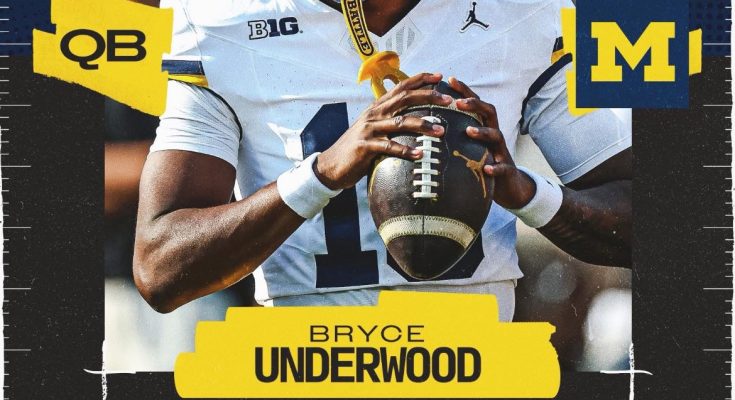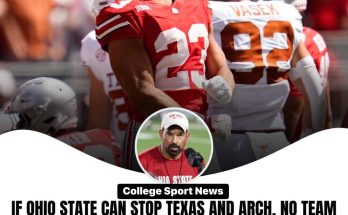Michigan entered the highly anticipated matchup against Oklahoma with all eyes on their young quarterback Bryce Underwood, who was making just his second career start. After earning the nod as a true freshman in the Wolverines’ season opener, Underwood was thrust into the national spotlight in Week 2 against one of college football’s most storied programs. While Michigan fans were eager to see flashes of brilliance from the former five-star prospect, the night instead revealed just how steep the learning curve can be for a teenager adjusting to the speed and intensity of big-time college football. In a 31-17 loss to the Sooners, Underwood’s struggles were evident, and while the performance wasn’t without glimpses of potential, it highlighted the work that lies ahead for him and for Michigan’s coaching staff.
From the opening series, it was clear Oklahoma’s defense had one mission: make life miserable for the freshman. Defensive coordinator Todd Bates unleashed a variety of disguised blitzes, showing pressure from one side before bringing it from another, forcing Underwood to process information in real time at breakneck speed. For a quarterback who is still learning the nuances of the college game, this posed significant challenges. Underwood looked hurried in the pocket, his timing disrupted, and he rarely appeared comfortable settling into his reads. The result was a stat line that reflected his struggles: just 14 completions on 32 attempts for 168 yards, one touchdown, and two interceptions. Those numbers, while not disastrous on their own, told the story of a quarterback who was rattled by pressure and a defense that capitalized on every mistake.
The first interception came midway through the second quarter, with Michigan trailing by just three. Facing a third and long, Underwood locked onto his primary target, never noticing the Oklahoma safety dropping into zone coverage. The throw was made with confidence but not with awareness, and the safety stepped in front to grab the pick, setting up a short field for the Sooners’ offense. A few plays later, Oklahoma extended its lead, and the momentum shifted firmly in their favor. That sequence underscored the inexperience of the Wolverines’ signal caller: in high school, his arm strength often allowed him to get away with risky decisions, but against elite competition, the margin for error is razor thin.
His second interception, thrown in the fourth quarter with Michigan desperate to mount a comeback, was the kind of mistake coaches expect from freshmen but dread in crunch time. Rolling to his right under heavy pressure, Underwood tried to force a pass into double coverage, hoping his receiver could make a heroic play. Instead, the ball sailed high and was picked off by an Oklahoma cornerback, effectively sealing the game. Those moments were difficult for fans to watch, but they also reflect the growing pains most first-year quarterbacks endure. For every Caleb Williams or Trevor Lawrence who dazzles immediately, there are countless others who must learn through mistakes before reaching their peak.
Michigan’s offensive line also did the young quarterback no favors. The Wolverines’ front, long considered a strength of the program, struggled to contain Oklahoma’s defensive front, which consistently generated pressure with both speed and power. Underwood was sacked four times and hit on several other occasions, leading to hurried throws and disrupted timing with his receivers. For a freshman still building trust in his protection, those breakdowns were especially damaging. It is one thing to struggle reading defenses; it is another to do so while feeling as though defenders are constantly closing in.
The bright spot for Underwood came in the third quarter when he orchestrated Michigan’s lone touchdown drive. After a strong kick return gave the Wolverines favorable field position, Underwood completed three consecutive passes, each showing poise and accuracy. The drive culminated with a 22-yard strike over the middle to tight end Colston Loveland, a perfectly timed ball that split two defenders. That moment reminded everyone why Underwood was such a highly touted recruit. His arm strength is unquestionable, and when given time, he can deliver throws few quarterbacks at his age are capable of. It was a glimpse of what Michigan hopes will become the norm in the years ahead.
Still, the broader takeaway from the night was that Underwood is not yet ready to shoulder the full responsibility of leading Michigan’s offense against top-tier competition. That is not an indictment of his talent, but rather a reminder that development takes time. Michigan’s coaching staff will likely spend the coming weeks simplifying the playbook, emphasizing shorter throws, and leaning more heavily on the running game to take pressure off their young quarterback. Against Oklahoma, Michigan’s rushing attack was stifled, forcing Underwood to attempt more passes than ideal. If the Wolverines want to maximize his growth while staying competitive, they must establish balance on offense.
The loss also sparked conversations among fans and analysts about whether Michigan should consider turning to a more experienced quarterback in the short term. But that perspective overlooks the long-term vision. Starting Underwood now, even with the expected struggles, accelerates his development. He will learn more in games like this—against elite opponents in hostile environments—than he ever could watching from the sidelines. It is a calculated risk by head coach Sherrone Moore, but one that could pay dividends as early as next season. Quarterbacks grow by experiencing adversity, and Underwood is now equipped with firsthand knowledge of the adjustments required at this level.
For Michigan as a whole, the defeat raises questions about where the program stands in the post-Jim Harbaugh era. A new coaching staff, a freshman quarterback, and the weight of massive expectations create a volatile mix. Losses like this one are part of the growing process, but in a conference as competitive as the Big Ten, patience is often in short supply. Fans have grown accustomed to playoff runs and victories over Ohio State, and they will want to see signs of progress sooner rather than later. Underwood’s journey, therefore, will be scrutinized week by week, every pass dissected, every mistake magnified.
On the Oklahoma side, the game was a validation of their defensive game plan. The Sooners entered the season determined to shed their reputation as a program built solely on offense, and their ability to frustrate a talented young quarterback showcased that they are evolving into a more complete team. For Underwood, the takeaway must be that defenses will continue to test him until he proves he can consistently punish their aggressiveness. The blitzes will keep coming, the coverages will keep disguising, and only with time will he learn to process it all with efficiency.
There is also the mental aspect to consider. True freshmen often struggle not just with the physical demands of college football but with the psychological ones as well. How Underwood responds to this performance will be critical. Will he let the mistakes linger, or will he use them as fuel to grow? Coaches and teammates have already spoken highly of his maturity, and how he bounces back in the coming weeks will say more about his long-term potential than the numbers from one game.
Looking ahead, Michigan’s schedule doesn’t get much easier. Conference play looms, and defenses across the Big Ten will surely be studying Oklahoma’s blueprint. For Underwood, the next challenge is proving that he can adapt, that he can learn from what went wrong and apply it quickly. The great quarterbacks are those who evolve with each game, and this early adversity could become the foundation for future success. Fans may not want to hear it in the aftermath of a loss, but Michigan’s best path forward is sticking with their young quarterback and allowing him to endure the growing pains.
In many ways, this game was less about the result on the scoreboard and more about the reality of building for the future. Michigan has invested in Bryce Underwood as the face of the program moving forward, and nights like this, though painful, are part of the process. The Wolverines will live with the mistakes, trust in his immense upside, and hope that by the time the games matter most in late November and beyond, the lessons learned in early September will have molded him into a more seasoned, confident leader.
Underwood’s performance against Oklahoma will be remembered as a struggle, but it should also be remembered as a step in his education. Michigan fans should temper expectations, understanding that greatness rarely arrives fully formed. Instead, it is forged in moments of adversity, in games where nothing comes easy and every decision is tested. Bryce Underwood has the talent to become Michigan’s next great quarterback. But as the loss to Oklahoma showed, talent alone isn’t enough. Growth takes time, patience, and the willingness to embrace the grind. For now, Michigan has a freshman still finding his footing, and a fan base learning that the road to the top with him at the helm will not be without bumps along the way.



